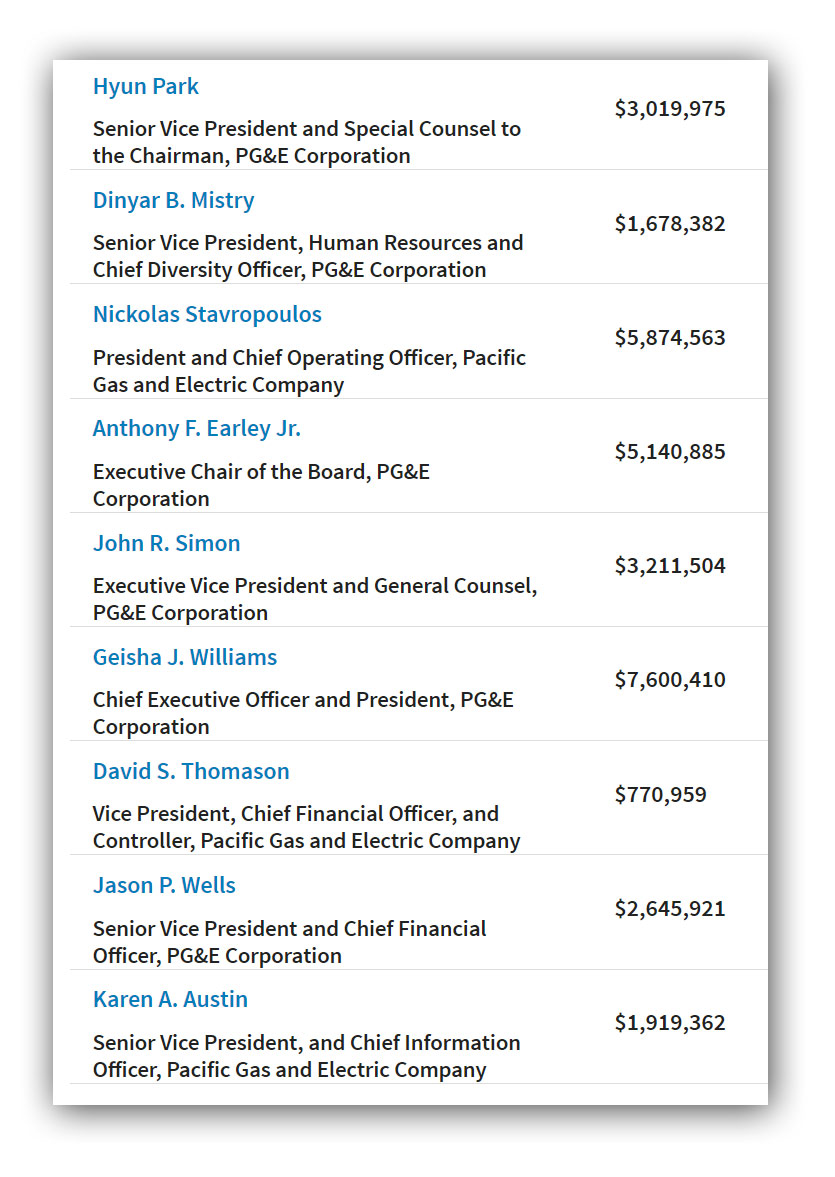Pacific Gas and Electric’s (PG&E) lawyers are apparently convinced that some of the wildfires may be a result of PG&E poorly maintaining lines, therefore PG&E might be provably culpable, therefore…
… Declare bankruptcy! Now, you can’t get at any of our money. [guard]
Faced with potentially ruinous lawsuits over California’s recent wildfires, Pacific Gas & Electric Corp filed for bankruptcy protection Tuesday, in a move that could lead to higher bills for customers of the nation’s biggest utility and reduce the size of any payouts to fire victims.
The Chapter 11 filing allows PG&E to continue operating while it puts its books in order. But it was seen as a possible glimpse of the financial toll that could lie ahead because of global warming, which scientists say is leading to fiercer, more destructive blazes and longer fire seasons.
The bankruptcy could also jeopardize California’s ambitious program to switch entirely to renewable energy sources.
PG&E cited hundreds of lawsuits from victims of fires in 2017 and 2018 and tens of billions of dollars in potential liabilities when it announced earlier this month that it planned to file for bankruptcy.
The “corporations are people, when it comes to free speech” doctrine sort of looks sketchy when a corporation decides to shoot itself in the head rather than face the music. And, also – coincidentally – the corporation takes the hit, not the independent human beings who ran the corporation and made the decisions that the mindless and heartless corporation executed on.

[source]
When I read that story I immediately thought, “I’m sure those executives all leapt up to put on their golden parachutes, hooked up, and clawed their way to be the first in line at the door.” I don’t see any documentation about that, but the executives of PG&E don’t seem to be doing too badly: [sal]

Being the captain of a sinking ship is great. Not only do you get to sink it, you get all kinds of cool gold braid and, when you swim ashore, shake yourself off, and go to the captains’ roost, your golf buddies will help you get another job as a captain. Meanwhile, the people whose houses burned can fight over the scraps that the lawyers don’t want.
Hahaha, I’m kidding. There are no scraps the lawyers don’t want.

Rather heart-warming decision from the Supreme Court. Supreme Court of Canada that is.
https://globalnews.ca/news/4909959/alberta-abandoned-orphan-wells-supreme-court-decision/
By no means a solution to the overall problem of abandoned oil wells but a tiny step in the right direction.
jkrideau
Oilfield pedant here – the problem isn’t that the orphan wells are abandoned it is that they are not being Abandoned* = the bankruptcy trustees are trying to walk away from the wells without properly Abandoning them. They were putting the interests of the creditors ahead of the public interest. The old privatize the profits and socialize the costs game.
*Abandoning a well is the process of cementing off the perforations and leaving the well in a condition where it will not be leaking hydrocarbons or formation water.
I am a little more…cautious…about this. I fear there is no way to make an electrical distribution system in dangerously fire prone area perfect-and ONE MISTAKE means conflagration. What is the solution? Even municipal utilities miss a tree or a branch. Think of the reality-thousands of miles of lines which cannot all be buried, realistically (especially at the value of the rural residential properties being served). “Government” utilities would still miss things. Socialist cooperatives would miss things. The problem is a scattered population (and I know you are a partaker of this American Dream, too, but Pennsylvania doesn’t dry out and burn like California) living down twisty narrow roads in ecologies designed to burn periodically.
It is easy to “blame” PG&E. And they fuck up big time. But the reality is any human system would also fuck up, given the realities of climate change and foothill ecosystems.
I don’t see a problem with bankruptcy filings in the abstract sense. However, if the shareholders use this bankruptcy to keep their stock and not have to pay lawsuits, then I have a problem. Bankruptcy should mean loss of ownership for the owners (e.g. shareholders), while still permitting a valuable company to continue operating.
This is also (probably) what should have happened during the financial crisis of 2007-2008 IMAO, and that’s a discussion for another time: let the companies keep operating, but make the shareholders be the first in line to lose everything, because they ultimately made the choices that caused their companies to go bankrupt – the executives are just proxies of the shareholders. Make the shareholders lose, and the new shareholders will do a better job selecting new executives. At least, let’s give this sort of capitalism for the rich a try, instead of capitalism for the poor and socialism for the rich.
Not on-topic, but saw this article and you immediately came to mind.
https://www.theguardian.com/cities/2019/feb/05/super-tall-super-skinny-super-expensive-the-pencil-towers-of-new-yorks-super-rich
@ 2 militantagnostic
Sorry, you are correct. Bad wording on my part.
Enlightenment Liberal: I agree completely with what you say about Moral Hazard. I do think most of the real power if held by management rather than scattered owners. Pension funds have a lot of stock, but I am not sure the corporate raiders or asset strippers who are often the other class of activist stockholders do much good for the economy, society, or, in this case, environment?
Enlightenment Liberal & bmiller:
I likewise agree there should be serious consequences and further that the problem is the Board and senior management, not shareholders. We really need the equivalent of a Bar Association for Board members/CEOs/CFOs/CIOs/Directors, etc. If the company is convicted of malfeasance and they complicit or negligent, or files bankruptcy under iffy circumstances, then they should have their license revoked and never be able to work in corporate management again.